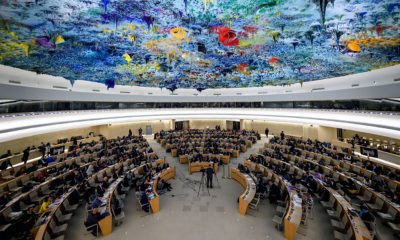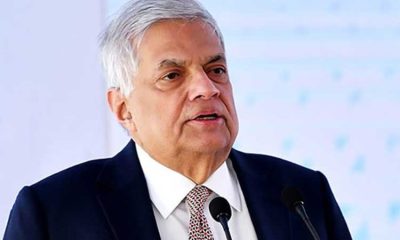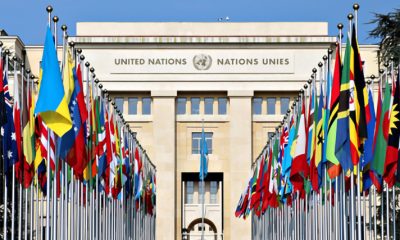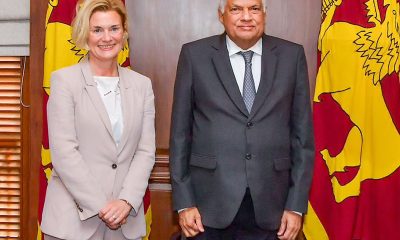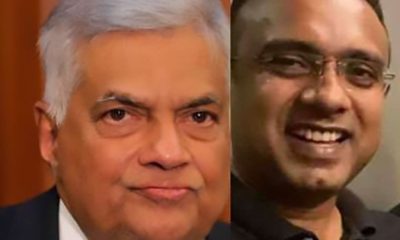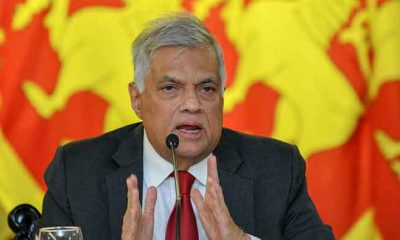Editorial
Thus spake Prez

Monday 06th November, 2023
President Ranil Wickremesinghe, on Friday (03), flayed the western bloc for its double standards on human rights. Speaking at a ceremony to mark the opening of a new court complex in Welimada, he said that all nations had to abide by the Universal Declaration of Human Rights. He pointed out the absurdity of the western nations adopting different approaches to human rights issues in Gaza and Sri Lanka.
Whoever would have thought a few years ago that Wickremesinghe would ever tear into the western members of the international community in this manner? It may be recalled that he used to draw heavy flak from his political opponents, especially the Rajapaksas and their cronies, for being subservient to the western powers.
The SLPP politicians and the nationalistic forces that back them berated him when the Yahapalana government, on his watch as the Prime Minister, co-sponsored a UNHRC resolution which called for a probe into alleged war crimes in Sri Lanka. On listening to him on Friday, one may have wondered whether the Rajapaksa’s Medamulana Chinthanaya had rubbed off on him. But his criticism of the West is nuanced and tempered with finesse.
President Wickremesinghe reiterated Sri Lanka’s position on the Gaza conflict and Palestine. Pointing out that Sri Lanka had condemned the Hamas incursion into Israel on 07 October and recognised Israel’s right to self-defence, he said Israel had to act within the confines of internal law. He reaffirmed Sri Lanka’s support for Palestine’s statehood while denouncing terrorism.
The home truths President Wickremesinghe came up with on Friday, for the consumption of the West are of interest, but what is of greater import is how, he thinks, Sri Lanka should prepare a strong defence to be presented in Geneva next year in the context of the ongoing war in Gaza and the reprehensible response of the US-led western bloc to Israel’s disproportionate counteroffensive and the resultant humanitarian crisis. The US has passed a 14.3-billion-dollar military aid package for Israel while thousands of Palestinians are perishing in Israeli attacks in Gaza.
Asking the proponents of the UNHRC resolutions against Sri Lanka to come to Geneva with clean hands, President Wickremesinghe asked rhetorically why Sri Lanka should answer questions posed by anyone whose hands were not clean. He stressed, in the same breath, the need for Sri Lanka also to go there with clean hands and implement the agreement reached between President Mahinda Rajapaksa and UN Secretary General Ban Ki-moon in 2009.
It was obvious that his reference was to President Rajapaksa’s undertaking to implement the 13th Amendment, among other things, although he chose to leave that unsaid. According to a joint statement issued by the UN and the government of Sri Lanka soon after the defeat of the LTTE in May 2009, ‘President Rajapaksa expressed his firm resolve to proceed with the implementation of the 13th Amendment ….”
The purpose of the clean hands doctrine is to protect the integrity of a court of law and ensure that those who seek equitable relief do not have a history of misconduct in the matter they are bringing to the court, as it would be unfair to grant them equitable remedies if they themselves have engaged in wrongdoing. Sri Lanka is likely to try to invoke the doctrine of clean hands in Geneva next year.
President Wickremesinghe said: “So, I thought I would ask the Minister of Justice and the Minister of Foreign Affairs, together with the Attorney General and our permanent representative at the UN, to consult international legal opinions on this … why shouldn’t it apply to the Human Rights Council?” The UNHRC may not be a court or a tribunal or a quasi-judicial body technically, but the principle of clean hands, one may argue, should apply to it as well, for its resolutions and decisions could have legal consequences and even serve as the basis for economic sanctions.
President Wickremesinghe seems to think that when Sri Lanka prepares its defence vis-à-vis the hostile human rights campaign against it in Geneva, it could also make use of the fundamental tenet in international relations, advocated by the US and its allies—the rules-based order. This guiding principle or the foundational concept, which has gained currency in the world, where sadly the law of the jungle has become the norm, basically means a shared commitment by all countries to conducting their activities in accordance with agreed rules that evolve over time, such as international law, regional security arrangements, trade agreements, immigration protocols, and cultural arrangements. President Wickremesinghe said: “We are all for the rules-based order … but then the rules must apply to everyone. It can’t apply to some and not to others.”
President Wickremesinghe’s arguments about the western double standards on human rights and Sri Lanka’s right to ask the critics of its human rights record to prove that they have clean hands and respect the so-called rules-based order are logical and tenable. But the world powers are impervious to reason and do not care a tinker’s cuss about justice and fair play when they further their interests. They have turned the entire UN system into ‘a cesspool of political bias’, which is the phrase used by US Ambassador to the UN, Nikki Haley, to describe the UNHRC while announcing her country’s dramatic exit from it, in 2018.
Editorial
Ensure safety of COPF Chairman

Saturday 8th June, 2024
It was with shock and dismay that we received the news about death threats to COPF (Committee on Public Finance) Chairman Dr. Harsha de Silva over the ongoing parliamentary probe into the on-arrival visa scam. Dr. de Silva yesterday told Speaker Mahinda Yapa Abeywardena, in Parliament, that he was facing death threats and intimidation, and it was incumbent upon Parliament to ensure his safety. He stopped short of naming names, but revealed that some ruling party MPs were among those who had ganged up against him. The Speaker only said there had been no complaint, and he would look into the matter.
The SLPP-UNP government has been doing everything in its power to have all parliamentary committees under its thumb. The COPE (Committee on Public Enterprises), which once helped restore public faith in the legislature by exposing state sector corruption, has now become a mere appendage of the incumbent regime, thanks to the appointment of SLPP MP Rohitha Abeygunawardena as its Chairman. The SLPP-UNP combine also tried to oust COPF Chairman Dr. de Silva, but in vain. However, it knows more than one way to shoe a horse.
The COPF, under Dr. de Silva’s chairmanship, has been a thorn in the side of the government, which is struggling to cover up numerous corrupt deals. Dr. de Silva yesterday told Parliament that he found it extremely difficult to function as the COPF head due to severe resource constraints his committee was facing; he himself had to pay the salaries of some of his staff members besides burning the midnight oil.
The sheer workload he had to cope with as the COPF chief had taken its toll on his health, he said, informing the Speaker that he was at the end of his tether, and at times thought of resigning from the COPF. This is exactly what the government wants him to do; resource squeezes and threats are aimed at making him quit.
On 26 May, Dr. de Silva revealed, in an ‘X’ post, that the COPF had uncovered some vital information about the visa scam and it would reveal everything after its final meeting on the issue; the COPF was committed to exposing the truth behind the controversial tender, he added. In an editorial comment on 27 May, we warned him.
While thanking him for his bold stand, we pointed out that by making such a statement, he had thrown caution to the wind, and become a marked target, with the government making an all-out effort to delay the COPF investigation lest the truth should come out much to the detriment of its interests in this election year. Unfortunately, what was feared has come about; Dr. de Silva is complaining of death threats and government moves to strangulate the COPF financially to derail its investigations.
Dr. de Silva’s predicament exemplifies the fate that befalls the few good men and women in Parliament. It is hoped that all those who seek an end to the state sector corruption will rally behind Dr. de Silva, and bring pressure to bear on the government to ensure his safety. Let Dr. de Silva be urged to reveal the names of those who have issued threats, veiled or otherwise, to him and are trying to scuttle the COPF probes.
Editorial
Dead man walking!

Friday 7th June, 2024
The SLPP-UNP government is going hell for leather to make bad laws as if there were no tomorrow. It is abusing its parliamentary majority, which has been retained with the help of some crossovers, for that purpose. The Opposition, the media and trade unions are up in arms, and understandably so. The incumbent regime is a dead man walking; it is so desperate that it is capable of anything. Hence the need for it to be restrained.
The Electricity (Amendment) Bill (EAB) plunged Parliament into turmoil yesterday, but the government secured its passage. The Supreme Court (SC) determined the entire EAB inconsistent with the Constitution and recommended changes thereto. After unveiling the Bill, sometime ago, Minister of Power and Energy Kanchana Wijesekera hailed it as an excellent piece of legislation aimed at straightening up the power sector to serve the public interest better.
The SC determination left him with egg on his face. He reminded us of the proverbial curate who, while eating a stale egg, assured his host, a Bishop, that parts of it were excellent. Wijesekera’s egg, as it were, made Parliament stink yesterday, but he sought to please his masters by praising it as a silver bullet.
EAB should have been discarded and a new one drafted in consultation with all stakeholders. But the government is apparently driven by an ulterior motive; its aim is not to serve Sri Lanka’s interests but to look after those of some moneybags.
It is not uncommon for Bills to contain some flaws, which are rectified either before or during the committee stage. But there is something terribly wrong with draft Bills that are full of sections inconsistent with the Constitution. The drafters of EAB have demonstrated their sheer ignorance of the supreme law, and that they are not equal to the task of drafting Bills. If they had read the Constitution at least perfunctorily, they would not have drafted such a bad law.
Ignorant and incompetent, they do not deserve to be paid with public funds and must be sent back to law school. They must be summoned before Parliament and questioned on their serious lapses, which have caused public faith in the national legislature to diminish.
Curiously, the MPs who demand that judges, doctors, Central Bankers, and other public officials be summoned before Parliament have taken badly drafted Bills for granted. The power sector trade unions yesterday alleged that EAB was of Indian origin and geared towards furthering the interests of Adani Group at the expense of Sri Lanka.
Most critics of EAB are agreeable in principle to the need for power sector reforms; the Ceylon Electricity Board should be given a radical shake-up, and transformed into a modern organisation capable of providing a better service at a lower cost. They only asked the government to tread cautiously, consulting all stakeholders and taking action to ensure that the country’s interests prevailed over everything else. But the government was in a mighty hurry to steamroller the Bill through Parliament, making the Opposition ask whether it was doing so at the behest of some external forces involved in controversial power generation deals here.
What is passed by the current Parliament can be either amended or abolished by a future parliament in a constitutionally prescribed manner. But that does not mean that a government is free to pass bad laws, making the country enter into long-term agreements with powerful nations and their investors. It looks as if the SLPP-UNP regime did not care two hoots about the consequences of its actions.
Editorial
Modi Magic on the wane

Thursday 6th June, 2024
The outcome of India’s parliamentary election (2024) has led to a ‘perspective ambiguity’. Prime Minister Narendra Modi lost no time in declaring victory for the BJP-led NDA alliance, which secured 293 seats in the 543-member Parliament, but he must be a worried man. The BJP is short of 32 seats to form a government under its own steam; it has lost 63 seats or about 20% of its parliamentary strength. It had 303 seats in the previous Parliament, and that number has dropped to 240.
Modi has become the second Indian Prime Minister to win a third term. The first PM to do so was Jawaharlal Nehru. But Nehru won an outright majority in Parliament in 1962; Modi has had to depend on smaller parties in his alliance to retain his hold on power. Modi must be reeling from a sharp drop in his victory margin in his own constituency, Varanasi; it has decreased to 152,000 from 480,000 in 2019 whereas Modi’s bete noire, Rahul Gandhi, won Raebareli by a staggering 390,000 votes.
Modi, who reigned supreme with 303 seats in the previous Parliament, is now dependent on parties such as Nitish Kumar’s JD-U and Chandrababu Naidu’s TDP to form a government. He has had to lead an alliance of strange bedfellows. Both Kumar and Naidu were bitter critics of Modi. Kumar helped form the oppositional alliance, the INDIA bloc, before switching his allegiance to PM Modi. Naidu also closed ranks with the BJP in the run-up to the election. These politicians have been described as extremely ambitious and highly unpredictable, and whether Modi will be able to manage them and consolidate his grip on the NDA alliance remains to be seen. They will demand plum ministerial posts in return for their support. The TDP is said to be eyeing Transport and Health portfolios! That is the name of the game in coalition politics, where it is not uncommon for the tail to wag the dog, so to speak. These two political leaders are however not the only problem Modi will have to contend with. The next five years will feel like an eternity for PM Modi.
Nothing would have been more shocking for the BJP than its defeat in Uttar Pradesh’s Faizabad constituency, where the Ram Mandir has been built. Modi may have thought he would be able to win the Lok Sabha election hands down after the consecration of that temple, which became a centrepiece of the BJP’s election campaign. The BJP lost that seat to the Samajwadi Party! Modi must be disappointed that the Ram Mandir hype failed to trigger a massive wave of support for his party. This particular defeat signifies a massive setback for the BJP’s ethno-religious agenda.
Modi’s divisive election campaign failed to yield the desired result. The BJP’s failure to secure an outright majority could be attributed to a host of factors, some of them being the suppression of the Opposition, the arrogance of power, chronic unemployment, and the rising cost of living. The BJP also did not care to reimage itself in a positive light to attract the youth.
Modi will hereafter see the Congress-led INDIA bloc with 223 seats, in his rearview mirror. The Congress (99 seats) and its allies have eaten into the BJP support base considerably, but they have a long way to go before being able to capture power.
The bumpy ride ahead for the BJP-led coalition government to be formed may improve the INDIA bloc’s chances of bettering their electoral performance and turning the tables on the BJP and its allies in time to come. Modi will have a lot to worry about in his third term.


